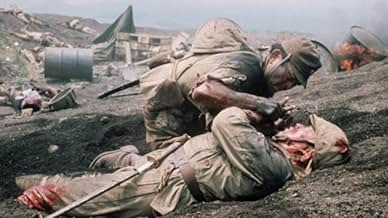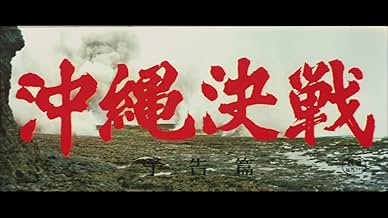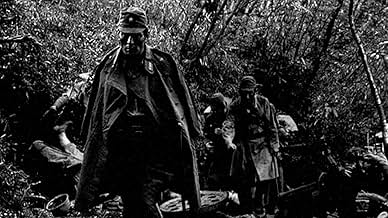IMDb RATING
6.9/10
502
YOUR RATING
Told from the Japanese perspective, this war drama captures the events of World War II's Battle of Okinawa - a massive amphibious assault by U.S. troops that left more than 150,000 Japanese ... Read allTold from the Japanese perspective, this war drama captures the events of World War II's Battle of Okinawa - a massive amphibious assault by U.S. troops that left more than 150,000 Japanese civilians dead.Told from the Japanese perspective, this war drama captures the events of World War II's Battle of Okinawa - a massive amphibious assault by U.S. troops that left more than 150,000 Japanese civilians dead.
- Director
- Writers
- Stars
- Director
- Writers
- All cast & crew
- Production, box office & more at IMDbPro
Featured reviews
Little known but impressively detailed and completely uncompromising depiction of the battle of Okinawa from the Japanese perspective. I think it deserves a rerelease or more exposure, because as an antiwar film, it's very impressive, and even ahead of its time.
American war films were still a fair way off from showing war in a truly hellish manner at this point in film history- there's a real misery in this one that prevents any battle scenes from being fun or exciting to watch, even if there is a degree of spectacle due to the relatively high budget.
That sense of doom and inevitable loss, coupled with the savage violence that pulls absolutely no punches (it's comparable to Saving Private Ryan, yet came out over 1/4 of a century earlier) makes it a tough but engaging watch, and it mostly earns its lengthy runtime of 2.5 hours.
And of course, a war film like this shouldn't pull punches. It's generally far better to show war on film as ugly rather than exciting, especially a conflict like the one on Okinawa.
Characters are simple but serviceable, and despite the limited character development, you can feel some sympathy for them as individuals stuck in a conflict, whilst still feeling angry at the whole institution of war itself. The way it occasionally checked in on how civilians were coping was particularly powerful and unique, too.
American war films were still a fair way off from showing war in a truly hellish manner at this point in film history- there's a real misery in this one that prevents any battle scenes from being fun or exciting to watch, even if there is a degree of spectacle due to the relatively high budget.
That sense of doom and inevitable loss, coupled with the savage violence that pulls absolutely no punches (it's comparable to Saving Private Ryan, yet came out over 1/4 of a century earlier) makes it a tough but engaging watch, and it mostly earns its lengthy runtime of 2.5 hours.
And of course, a war film like this shouldn't pull punches. It's generally far better to show war on film as ugly rather than exciting, especially a conflict like the one on Okinawa.
Characters are simple but serviceable, and despite the limited character development, you can feel some sympathy for them as individuals stuck in a conflict, whilst still feeling angry at the whole institution of war itself. The way it occasionally checked in on how civilians were coping was particularly powerful and unique, too.
The film is pretty bad across the board. Even ignoring the poor special effects due to budget, the direction and editing is poor. A tighter script and decent editing would have done wonders for what could have been a good film. The story line is grim, of course, but is badly handled and is an emotionless tale of waste. To get an emotional response from an audience you need to care about the characters, and that empathy is what the movie truly lacks. The film is a docudrama, but lacks drama and the power of a documentary. It's worth a look, but is certainly not a good film. Compare BoO with Story of a Prostitute, Fires on the Plain, or The Burmese Harp, and you'll understand why it is a forgotten film.
From the director of the terrific "Japan's Longest Day", this is an ambitious documentary-styled recreation of the battle for Okinawa, where hundreds of thousands of soldiers and civilians were abandoned by the Japanese military in order to better protect the mainland. The soldiers fortified themselves in caves and fended of an overwhelming American attack over a period of several months. Unfortunately, the filmmaker's talents don't match their ambitions. "Japan's Longest Day" was a fascinating film written by Shinobu Hashimoto about a little known military revolt at the end of the war. Okinawa is dramatically inept with misplaced bits of humor, and the crowd scenes never number more than 50, making it seem far less epic than it purports to be. The photography is bland and the blood very fake. The desperation never seeps in like it should, but the film does a good job of showing what they went through. It also shows that when the going gets tough, the Japanese commit suicide - according to this film it must have been the leading cause of death. The events depicted are similar to "Sands of Iwo Jima" - so if you like that you might like this. Okinawa is still occupied by American forces. Script by Kaneto Shindo ("Onibaba").
I have a desire to look deeply into films from 1971 and came upon this oddity which is on R1 DVD, but still pretty much unknown. It is directed by Kihachi Okamoto who was a versatile director, happy directing comedy alongside such far as Dai-bosatsu tôge / Sword of Doom (1966), perhaps the greatest chambara movie going. As well as that The Battle of Okinawa stars Tetsurô Tanba and Tatsuya Nakadai, the two most famous Japanese actors of a generation disregarding Mifune. No slouch at directing himself (Onibaba, Kuroneko) Kaneto Shindô was involved in writing the script. So there's pedigree aplenty for the movie.
The Battle of Okinawa ended very shortly before the atomic bombings ended the entire conflict in the Pacific. It was a battle of cataclysmic ferocity that accounted for the lives of a quarter of a million people, which included a third of the island's civilian population. It was almost the end of a civilisation and a way of life, Okinawans having a distinctive culture that was almost obliterated here. The Americans never left, almost a fifth of the island is still occupied by US military bases.
The movie is both educational on the tactical side of the battle, but also revelatory about Japanese culture of the time. The military triumvirate on the Japanese side consisted of General Ushijima, and his two subordinates Lieutenant General Isamu Cho (Tanba) and Colonel Hiromichi Yahara (Nakadai). Ushijima is an almost catatonic buddha who admits having inferior tactical knowledge and so chooses sides in arguments between Cho and Yahara. Cho tends to favour aggression, Yahara is always more moderate. Nakadai here wears the same expression on his face all the way through the movie, maybe he grimaced and the wind changed, for he wore it all the way through Hideo Gosha's great movie The Wolves, also released in 1971. Joking aside though it's an iconic expression, which is awesomely fatalistic, seeming in one go to express the sheer lunacy of the pro-imperial attitudes in the army, and the desire to die. Yahara's appears to be the greatest lunacy though, he opts to let the American forces land unopposed in order to conserve ammunition, which would be needed for later in the battle.
There are many terrible things that happened during the battle, so many families committed suicide in order to avoid contact with the American troops. It's still a point of controversy as to how willing they were, and how much they were forced to by the army. Families gathered round in circles and unpinned grenades, the survivors attempted to batter each other out of their misery. Quite spectacular suicide missions are commemorated. For example a plane landing in a US-controlled airfield (the rest of the squadron succumbing to anti-aircraft fire), troops disembarking and throwing grenades at the US planes, entirely without hope of surviving It's quite interesting to discuss whether the movie glorified the resistance, certainly suicide missions are shown as heroic, whilst entirely unpalatable to the Western eye, but also the movie does question whether there is more to life, a greater reason to live than merely to serve the Emperor.
Some disappointments from a cinematic point of view, firstly the archive footage that announces the film is shot in 4:3 but here massively stretched to 2.35:1, which looks pretty sloppy. Then the film is not very well budgeted I feel so the action often looks kind of fake, but also there wasn't enough cash in the kitty to get Americans over, so the American soldiers (who generally hide their faces, are seen from behind or in the distance) are played by Japanese as well. Luckily we don't see Americans very often, their presence is only known via artillery bombardment, and when we do it's not Thompson sub-machine-guns that they're carrying. Actual combat scenes are very stylised and reminiscent of jidai-geki such as Ran in the way that the platoons of soldiers behave. It's fortunate that the Americans don't play a part in the movie, to the defenders on Okinawa they may as well have been Martians, the issues here were all Japanese, about what attitude to take in the face of cultural destruction and overwhelming incursion. That's not to downplay the loss of American life, but that would simply be for another movie.
I felt in the end that the film was a fitting testament to the deaths of the defenders of Okinawa and the populace. The movie kind of captures an essence of bravery, lunacy and hollow childlike subservience, as well as the sheer devastating horror.
The Battle of Okinawa ended very shortly before the atomic bombings ended the entire conflict in the Pacific. It was a battle of cataclysmic ferocity that accounted for the lives of a quarter of a million people, which included a third of the island's civilian population. It was almost the end of a civilisation and a way of life, Okinawans having a distinctive culture that was almost obliterated here. The Americans never left, almost a fifth of the island is still occupied by US military bases.
The movie is both educational on the tactical side of the battle, but also revelatory about Japanese culture of the time. The military triumvirate on the Japanese side consisted of General Ushijima, and his two subordinates Lieutenant General Isamu Cho (Tanba) and Colonel Hiromichi Yahara (Nakadai). Ushijima is an almost catatonic buddha who admits having inferior tactical knowledge and so chooses sides in arguments between Cho and Yahara. Cho tends to favour aggression, Yahara is always more moderate. Nakadai here wears the same expression on his face all the way through the movie, maybe he grimaced and the wind changed, for he wore it all the way through Hideo Gosha's great movie The Wolves, also released in 1971. Joking aside though it's an iconic expression, which is awesomely fatalistic, seeming in one go to express the sheer lunacy of the pro-imperial attitudes in the army, and the desire to die. Yahara's appears to be the greatest lunacy though, he opts to let the American forces land unopposed in order to conserve ammunition, which would be needed for later in the battle.
There are many terrible things that happened during the battle, so many families committed suicide in order to avoid contact with the American troops. It's still a point of controversy as to how willing they were, and how much they were forced to by the army. Families gathered round in circles and unpinned grenades, the survivors attempted to batter each other out of their misery. Quite spectacular suicide missions are commemorated. For example a plane landing in a US-controlled airfield (the rest of the squadron succumbing to anti-aircraft fire), troops disembarking and throwing grenades at the US planes, entirely without hope of surviving It's quite interesting to discuss whether the movie glorified the resistance, certainly suicide missions are shown as heroic, whilst entirely unpalatable to the Western eye, but also the movie does question whether there is more to life, a greater reason to live than merely to serve the Emperor.
Some disappointments from a cinematic point of view, firstly the archive footage that announces the film is shot in 4:3 but here massively stretched to 2.35:1, which looks pretty sloppy. Then the film is not very well budgeted I feel so the action often looks kind of fake, but also there wasn't enough cash in the kitty to get Americans over, so the American soldiers (who generally hide their faces, are seen from behind or in the distance) are played by Japanese as well. Luckily we don't see Americans very often, their presence is only known via artillery bombardment, and when we do it's not Thompson sub-machine-guns that they're carrying. Actual combat scenes are very stylised and reminiscent of jidai-geki such as Ran in the way that the platoons of soldiers behave. It's fortunate that the Americans don't play a part in the movie, to the defenders on Okinawa they may as well have been Martians, the issues here were all Japanese, about what attitude to take in the face of cultural destruction and overwhelming incursion. That's not to downplay the loss of American life, but that would simply be for another movie.
I felt in the end that the film was a fitting testament to the deaths of the defenders of Okinawa and the populace. The movie kind of captures an essence of bravery, lunacy and hollow childlike subservience, as well as the sheer devastating horror.
This is an exhaustive (and exhausting) account of events surrounding the Battle of Okinawa, beginning with pre-invasion defense preparations (starting in July 1944), then moving to the aerial bombardment, to the US invasion, and finally to ground combat. In its desire to be "complete" and thoroughly document the battle (from the Japanese POV, of course), it shortchanges story and characters. It feels like three hundred mini-vignettes rapidly spat out by a machine gun rather than a smoothly flowing, cohesive whole.
As for historical context and accuracy, others have already pointed out their reservations about the Japanese being framed as noble, even heroic, warriors fighting the good fight against overwhelming odds. This complaint about its narrative framing also applies to virtually every Japanese film about World War II. In the collective cinematic imagination of Japanese WWII films, the "war" is treated almost as a cosmic, non-human, event that simply happens TO them. Unlike in many German films where characters ponder "will the world forgive us?" or "now our chickens are coming home to roost. We will now reap what we have sown", in Japanese films, it is almost always "oh poor us. We are losing. It's so sad. Why must we lose? What about our honor? What about our children?"
As for historical context and accuracy, others have already pointed out their reservations about the Japanese being framed as noble, even heroic, warriors fighting the good fight against overwhelming odds. This complaint about its narrative framing also applies to virtually every Japanese film about World War II. In the collective cinematic imagination of Japanese WWII films, the "war" is treated almost as a cosmic, non-human, event that simply happens TO them. Unlike in many German films where characters ponder "will the world forgive us?" or "now our chickens are coming home to roost. We will now reap what we have sown", in Japanese films, it is almost always "oh poor us. We are losing. It's so sad. Why must we lose? What about our honor? What about our children?"
Did you know
- TriviaDirector Hideaki Anno has mentioned that this is the film he has watched the most in his life, well over 100 times.
- ConnectionsReferenced in Caméra d'Afrique (1983)
- How long is Battle of Okinawa?Powered by Alexa
Details
- Release date
- Country of origin
- Language
- Also known as
- Les marines attaquent Okinawa
- Production company
- See more company credits at IMDbPro
- Runtime2 hours 29 minutes
- Color
- Sound mix
- Aspect ratio
- 2.40 : 1
Contribute to this page
Suggest an edit or add missing content

































